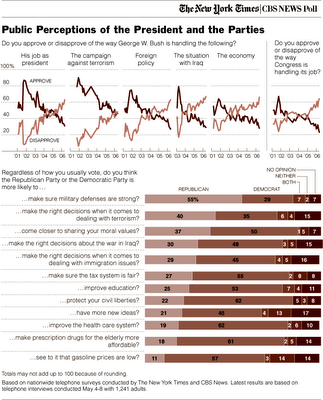Bending the Third Rail
Because We Should, We Can, We Do
Cost of the War in Iraq
(JavaScript Error)
Wednesday, May 10, 2006
Who's Trend Is It?

And this is the most salient analysis of the Bush polls that I have seen yet (from an emailer to Froomkin)who puts into words what I've tried to say:
"I don't believe that the president has had a true slide or fall from grace like other political figures might. In my opinion this administration has been pretty consistent in their quest to expand executive powers, focusing on the wrong things . . . and basic lack of accountability since early 2001. What did change during this time were the attitudes of the American public and the press. September 11th changed the way that the American people saw President Bush and the office of the president in general. They gave him much more credit than usual for small successes and refused to hit him hard for the many big mistakes of his first term.So maybe we're returning to sanity after the 911 attack?
"So many reports now are focusing on why his poll numbers are so low today (Iraq, gas prices, Katrina) but no one has examined the psychology of the American public and press that elevated the man to such high ratings not for what he had done but for what had been done to us. I would be interested to hear this as part of the discussion because if we can't learn what so many of us in America did wrong for five years, we will be sure to repeat these mistakes and give an undeserving leader entirely too much power over us again."
2 Comments:
About Me
- Name: Greyhair
- Location: Wine Country, California
I'm a very lucky person with every allergy known to man but still happy to be enjoying a wonderful life living in the best place in the world!
Blogroll
The Big PictureBillmon
Blah3.com
Born at the Crest of Empire
Eric Alterman
Eschaton
FireDogLake
Feingold's Blog
Dan Froomkin
The Huffington Post
Hullabaloo
The Illustrated Daily Scribble
Jesus General
Juan Cole
Matilda's Advice and Rants
Mia Culpa
MsJan Quilts
Needlenose
The Oil Drum
Political Animal
Political Wire
Spooks of the Ozarks
Talk About Corruption
TalkLeft
Think Progress
War and Peace
The Washington Note
So, compliments being said as preface,
I do agree with the point expressed in the excerpt, but, I would argue that analysis only applies to a segment. The point I was trying to express is that approval ratings have peeled away sequentially with some overlap. I don't argue that 9-11 bought this president tons of goodwill(which is pretty sick if you think about it too much,) but it is the manner in which the support has peeled off with which I would argue. It has created a nearly straight trend line, but it hasn't been a uniform erosion. First it was the Dems leaving Bush, then came the independents, and now the Repubs. Overlap, of course, but that's been the pattern.
I agree with the psychology argument, but I think it oversimplifies and doesn't reflect what's really gone on. Alot of Dems left over the invasion of Iraq, for example. I would argue that that action was seen to burst their bubble of trust and goodwill. For the Bush base, they had stayed with him through it all because they believed he was a man of strength, character and morals, that they could rely on because he was "one of them." Harriet Miers broke that belief.
I think I'm picking nits here. I'm just gonna stop this.
Mike
;)
I would agree with you as far as it goes and relates to those who are informed. Unfortunately, the great majority of voters aren't and simply respond to gut level emotions and intuition. That's who Bush has lost. The momentum of losing the left (which he never had), then the middle inevitably leads to losing some on the right. Hell, 4% in the poll didn't even know who Bush was. So we're not talking about an exceptionally well-informed voter class here. Momentum and "trendiness" matter as much as substance these days. It's now cool to hate Bush whereas after 911 and through the lense of trauma, it was cool to love him.
I still think that in any ordinary time (read non-crisis period), Bush would have never been very popular. He started out a virtual minority President and was falling when 911 happened. The polls I've looked at clearly suggest that without the "war on terror", Bush would have lost in 2004.
Take that, and $4, and you can buy yourself a mocha.